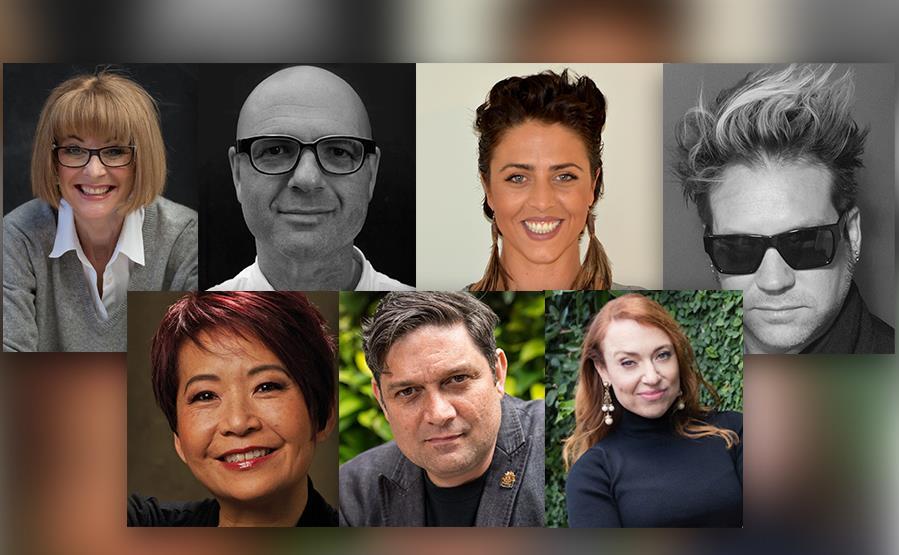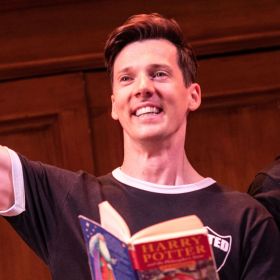21 Reasons I Know the Australian Arts Industry Will Bounce Back Better than Ever:
Yes, these are dark times my friends, you don’t need me to tell you that. My job currently is trying to work out how to save an organisation that relies on Box Office and Venue Hire for more than 80% of its revenue (and we’re the lucky ones!). Saving jobs, survival, is my total focus for now. But my mind’s started to turn to reasons why our industry might not just survive, but one day roar back to life better than ever. All of the reasons I could think of were people…
It started as a mental health project, really. I was feeling so despondent, and hopeless, and truly searching for reasons to believe everything was going to be ok. Now that I’ve finished all 21, I realise that it’s given me so much hope, focussing on other people’s strengths and capacities, not contemplating my own sadness.
Here – in three parts, featuring seven champions per part – are all 21. Consider them love letters to our theatre industry.
Read: 21 reasons our arts industry will bounce back better than ever (Part One)
Reason 8: Michelle Forte
When I think of the people that really give me hope for the future of our business, not all of them are nationally known figures in our industry. So you’re forgiven if you don’t know the name Michelle Forte, but here’s why you should. The frontline of building our industry is often far away from schmick venues in Sydney or Melbourne – it’s found in regional Australia, and as often as not in modest studios and community halls where amazing teaching and nurturing of young artists is happening. I’ve witnessed this work being done at the very highest standard, in an innovative and dynamic way by Michelle Forte at Austinmer Dance Theatre. ‘The other ADT,’ as I like to call it (sorry, Garry!), is a unique company. Built by Michelle over many years, it now describes itself as ‘an emerging professional company for elite contemporary dancers aged 17-25 years’. It’s a pre-professional/early professional training company for young dancers for whom the usual training pathways aren’t always appropriate or wholly successful. Michelle commissions works from internationally acclaimed choreographers who come (often from overseas) to work with the dancers; produces adventurous, exciting works of an incredibly high standard in venues and festivals; and nurtures an extraordinary group of young dancers. As we emerge from the nightmare of this shutdown, we’ll need to look for new, different models of artist development – models that don’t just dump unprepared young people into the uncertainty of life as a professional artist. We could learn a lot from Michelle and Austinmer Dance Theatre, so check them out at www.austinmerdancetheatre.com.
Reason 9: Yaron Lifschitz
No surprises here. Let’s face it, Yaron would make everyone’s list of the most influential arts people in this country, and for good reason. But this isn’t just a list of the influential, it’s a list of those that give me hope for the future of the arts in Australia. Everyone knows the legend of Yaron, how he took a little-known Brisbane circus company and turned it into the global phenomenon that is Circa. His artistic vision and talent as a director is well-known, but Yaron’s greatest value to our industry is found in other qualities of his. In this time of crisis, and in its aftermath, the industry is going to need extraordinary moral leadership – people whose skills and experience are coupled with strong principles. In this regard, Yaron has proven as a leader that his great ability to imagine unknown futures, and his great artistic drive and ambition, are matched by his care for those he works with – not just at Circa, but at the many organisations that partner with Circa. He’s proved himself a great collaborator, supporter and friend to many in our industry, myself included, and it’s those qualities that will put him at the centre of the fight to rebuild our industry. His incredible ability to think, create and innovate, combined with his deep compassion and moral compass, make him a rare leader in troubled times like these, and one that I think many of us will be looking to follow.
Read: Art, empathy and crossing borders: a provocation by Yaron Lifschitz
Reason 10: Merindah Donnelly
Back in 2012, at a meeting of performing arts presenters and First Nations cultural and community leaders at the Australia Council, I remember first meeting a vivacious, proud, dynamic young woman named Merindah Donnelly. I recall being impressed back then, and since then I’ve seen her make her incredible mark on our industry. Then she was working at the Ozco in market development, and she went on to be integral in a range of important industry events and programs. Over the last five or six years, as Executive Producer of BlakDance, she has made a particularly significant contribution to sector transformation – connecting and nurturing First Nations artists, being a leading voice in Australia connecting globally with other First Nations arts organisations and networks, and advocating for an exciting future for the arts in Australia, one that doesn’t just acknowledge the richness of our First Peoples’ artistic expression, but which puts First Nations arts leaders at the centre of driving our industry, with agency and self-determination. We have an extraordinary opportunity as we come out of this COVID-imposed pause to rethink what we want our industry to be. But we can’t build a future we can’t imagine. Merindah’s proven herself to be one of our leading lights in being able to imagine a different future for our sector, and then inspire others to work with her to build it. I can’t wait to see what she imagines comes next after this!
Read: Re-futuring as recovery for the arts
Reason 11: Scott Maidment
We don’t use the word ‘impresario’ much anymore, but when I think of Scott Maidment that’s the word that comes to mind. It captures the passion, risk and romance associated with someone who doesn’t, like the rest of us, make projects happen with other people’s money (in most of our cases, public money!) but who puts everything they have on the line for the love of show business. In the post COVID-19 arts world we are going to need those who love art and artists so much they’re prepared to take real risks to make the magic happen again. And believe me, Scott knows how to make that magic happen. He built his Strut and Fret Production House the hard way, with no Government subsidy, just a combination of business savvy and artistic flare. His body of work speaks for itself – show after hit show, a mix of spectacle, circus cabaret craft, wonderful creative vision, and an instinct for what will make the punters line up in their thousands outside Spiegeltents across the country and around the world. Strut and Fret has become such an international success story that when the virus hit they had dozens of performers all over the world that they had to suddenly help get back home, including performers stuck on cruise ships! When we’re finally ready to try and get this show on again, we need to make sure that it’s not just subsidised companies that we focus on – we’ll need our impresario extraordinaire Scott Maidment and his brilliant team at Strut and Fret with us on the frontline.
Reason 12: Annette Shun Wah
From being one of a handful of Asian-Australian faces regularly on TV to becoming an influential theatre producer who’s put Asian Australian artists onto mainstream theatre stages, Annette Shun Wah is a true pioneer. In the last seven years, as Executive Producer of Contemporary Asian Australian Performance (CAAP) she’s been instrumental in developing and promoting a range of Asian Australian theatre-makers and performers. CAAP has been making brilliant, dynamic, relevant theatre that audiences want to see, and doing it with incredibly limited resources. The COVID-19 crisis, with its cancellation of hundreds of shows across the country, might well become known as the ‘great programming pause’, and with it comes a chance to stop and think about what we put on our stages. There’s a priceless opportunity to not restart the traditional treadmill of bleached monoculture when our industry opens up again, but instead remake our programs as a reflection of the communities we actually live in. The fact that there are many amazing shows and artists to program that do reflect the diversity of Australian society is in no small part due to the work of Annette Shun Wah. This richness of programming possibilities is incredibly exciting, and as Annette points out, if we program diverse work maybe we’ll actually get to see more diverse faces in our audience too. With a new role as Director of the Oz Asia Festival, I’m predicting that Annette will become an ever more influential voice in our industry as we rise from the ashes, and build a new sector that hopefully looks a bit more like the contemporary Australia we actually live in.
Reason 13: Wesley Enoch (AM)
Wesley’s journey to become Director of Sydney Festival is a story of talent and determination – his theatre beginnings in Brisbane, helping found Kooemba Jdarra, Brisbane’s First Nations theatre company, working with pretty much every major theatre company in the country. As a director, actor, writer and speaker, Wesley’s impact on our industry is unquestionable. But what makes him really special are personal qualities you don’t always find in leaders in our industry. Some examples: his online birthday messages – how he finds the time to send so many of us, his colleagues, thoughtful, personalised birthday greetings is a mystery, but it speaks to the personal care he shows those he works with. Not many directors of Wesley’s status would spend most of the evening at a season launch animatedly talking in a corner with your teenage kids, as Wes did one year at a Merrigong launch, making those young people feel that they were more important than any of the industry, sponsors or subscribers who wanted his attention. Some words of Wesley’s have been echoing in my head recently – a while ago he rang to apologise for something that had taken place with a show of his that was touring. When I reminded him that it really wasn’t his fault, and was totally outside his control, he answered with the simple, powerful, words: ‘As leaders we have to take responsibility’. Those words pretty much sum up the great example that Wesley provides all of us. At heart he is a storyteller and recently he’s been out there telling the story of our industry, helping to explain to people what the arts is going through. His leadership – the heart, the voice, the example he provides – will be crucial as we emerge from this great disruption. We should listen to him more.
Reason 14: Olivia Ansell
Post COVID-19, the Australian performing arts industry is going to look very different. We’ll be searching for new business models, and that will mean different approaches to how we work across the sector – between artforms, different audiences, and crucially, across the subsidised/commercial sector divide. I suspect that the people who will really thrive in the new arts world will be the connectors – those who naturally connect diverse parts of our industry. One of these natural connectors, whose work I really admire, is Olivia Ansell. She’s currently Head of Contemporary Performance at the Sydney Opera House. While ‘contemporary performance’ is one of those terms that’s certainly open to interpretation, it is far too often code for work that not many people want to pay to see! Olivia’s background has made her open to seeing contemporary performance in a far more expansive way and searching out projects that brilliantly thread the needle of being both artistically dynamic, and popular with audiences. She’s energetic, imaginative, and entrepreneurial, seeking out diverse partners across the industry to make exciting producing and presentation opportunities possible – something the Opera House hasn’t always been great at doing. Olivia’s background is in dance, having trained at Alvin Ailey in New York and then QUT, and having choreographed for numerous diverse companies across the country. Stints as a producer and curator have given Olivia a great eye for exciting new work that audiences actually want to buy tickets to! Her experience in building projects with a range of both commercial and subsidised sector partners will be vital in the post-COVID arts world where entrepreneurial skills will be at a premium. I can’t wait to see what she’ll cook up when we can finally reopen venues. POSTSCRIPT: Since this was originally posted on Facebook, Olivia has been appointed the next Director of Sydney Festival – so even bigger expectations now!
Read: 21 reasons our arts industry will bounce back better than ever (Part Three)





